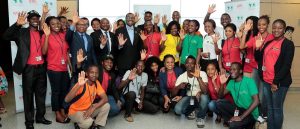Climate change has resulted in considerable environmental challenges in Nigeria, impacting every region and socio-economic group. Nigeria has a youthful population with more than 70% of the population below 30 years of age.

The Nigeria, National Bureau of Statistics (NBS) had earlier stated that the youth population account for about 51% of the total population with the age bracket 15 to 34 years old. Despite the growing onset of climate emergency, it has been reported that climate change literacy and awareness remain poor among the Nigerian youth.
In Nigeria, the catastrophic flooding in 2022 displaced more than 1.4 million individuals, resulted in over 603 fatalities, left approximately 2,400 people injured, and caused damage to around 82,035 homes. Additionally, the heatwaves of 2024, which affected all geopolitical zones serves as a stark illustration of these effects, placing immense pressure on commercial agriculture and jeopardising food security among other immediate challenges.
As reported by statista.com, in 2020, over 60% of Nigerians were unaware of climate change. Given that more than 70% of Nigeria’s population consists of young people, it is imperative to effectively harness the potential of this youthful demographic bulge in the battle against climate change. Unfortunately, a significant portion of the Nigerian populace remains indifferent to discussions surrounding climate change.
This indifference highlights the relatively small number of youths actively engaged in climate advocacy compared to those who lack awareness. Consequently, it is evident that the struggle against climate change in Nigeria is far from being resolved, as most of the workforce lacks essential knowledge regarding this critical issue.
Nonetheless, while significant work remains, it is essential to acknowledge the contributions of various organisations that are diligently collaborating with both local and international partners to educate young people about climate change. These organisations emphasise the importance of empowering youth with strategies for climate change adaptation and mitigation.
As the generation that has grown up with technology, if properly educated on climate change issues, these young individuals can play a crucial role in assisting the country in executing the numerous policies and action plans aimed at addressing the effects of climate change in Nigeria.
On August 28, 2024, GreenHub Africa, in partnership with the World Resources Institute (WRI) and the Federal Ministry of Environment, conducted a “Youth Environment and Climate Change Leadership Training” for more than 300 young individuals in Nigeria. This training served as an introduction to a comprehensive course developed by the collaborating organisations, aimed at educating Nigerian youth about climate change and its fundamental aspects. The curriculum will encompass five key modules: Climate Change Negotiation and Policy Analysis, Climate Change and Health, Climate Finance and Grant Writing, Green Entrepreneurship, and Just Transition & Energy Access.
It is essential for governments at all levels to support the commendable initiative offered by these organisations, aimed at educating the youth about climate change. This objective can be realised if the state Ministries of Environment throughout the federation work in partnership with the organisers to facilitate easy access to these educational programmes for the youth in their respective states.
Additionally, organising one or two days dedicated to sensitisation and awareness-raising activities for the youth in their states would further enhance this effort and making the youth participant ambassadors in their respective domains will go a long way in entrenching sustainability.
I urge the partners who have diligently created these materials to leverage all available platforms, particularly, social media channels such as TikTok, Facebook, WhatsApp, X (formerly Twitter), LinkedIn, and YouTube, to effectively reach the intended audience, specifically the youth. Additionally, it is essential to collaborate with major telecommunications companies in the country to ensure that targeted flash messages are disseminated to all subscribers whenever they recharge their phones or check their account balances, informing them about how to access training modules at no cost.
Utilising unskippable advertisements on YouTube videos and Facebook reels will further capture the attention of young individuals, encouraging them to enroll in courses that equip them with the necessary knowledge to combat climate change.
The Centre for Climate Change and Development (CCCD), in close collaboration with the Society for Planet and Prosperity (SPP), aligns with the initiatives put together by the WRI and Green Hub, Both CCCD and SPP recognise the importance of the youth population in addressing climate change. The organisations believed that the future is in the hands of the youth, and if we do not safeguard the present, there will be no future to speak of.
The CCCD and SPP are poised to commence empowering youth with climate education and building their capacity to participate in decision making process for the development of effective climate solutions and ensuring sustainable development without leaving anyone behind.
Therefore, to achieve this, immediate action is imperative, and collective efforts must be made to educate the youth on the critical issue of climate change. The platform for accessing these courses is set to be launched on September 26, 2024, and will be available for three months.
Anieze is a Research Fellow at the Centre for Climate Change and Development (CCCD), Alex Ekwueme Federal University, Ebonyi State
